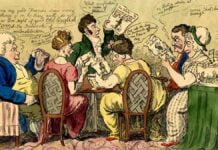Jean Valjeanum Paavangalile Raashtreeyashariyum is a poem written by P N Gopikrishnan and published in Mathrubhumi Weekly, 8 June 2025 edition. It was translated into English by K C Muraleedharan as Jean Valjean and the Political Correctness of Les Misérables. This year marks the centenary of the translation of Les Misérables by Nalappadan. The poem draws upon its characters and narrative thread, weaving them into its texture. It also refers to the yellow passport once issued in France to those who had been released from prison.
Summary
The poem begins with the speaker encountering Jean Valjean, the central character from Victor Hugo’s Les Misérables, on his way back from Punnayurkulam, a small village in Kerala. Valjean is seen buying “Modern bread,” a mass-produced, packaged product that symbolises the ordinary and regulated consumer world. The speaker teasingly remarks that Valjean is now “politically correct.” Valjean replies with irony: his life within the novel was anything but correct by such standards.
He recalls his past in Hugo’s narrative—stealing bread for survival, escaping with silverware from the benevolent Bishop, tricking authorities, running from justice, sheltering Cosette, rescuing Marius, and constantly evading Javert. His existence was defined by crime, deceit, and rebellion, but beneath all of it was hunger, poverty, and a restless, “turbulent soul.” Valjean insists that his transgressions arose not from malice but from social and existential desperation. The speaker realises the contrast: what was heaven for the privileged was hell for the oppressed, what was order for some was suffocation for others.
The poem highlights how the oppressed sustain the structures that privilege the few: “For your ships to move / We had to pull the oars.” Even the Bishop’s saintliness shines only because Valjean had sinned; Javert’s career depends on Valjean’s fugitive status. The system constructs morality by placing people in “punisher-offender halves.”
In the closing section, Valjean leaves behind the bread packet, complete with its price tag, expiry date, and nutritional facts—a symbol of a modern, bureaucratic, “politically correct” world of order and regulation. Along with the bread, he hands over a “yellow passport”—a reference to the infamous convict’s identity papers in Les Misérables, which marked Valjean as an outcast. In the poem, he passes this passport to a migrant worker, described as “politically incorrect,” stigmatised as a “guest labourer.” The poem closes on a haunting note: when societies divide themselves into rulers and ruled, punishers and offenders, perhaps fiction alone can give dignity and shelter to the marginalised.
This poem functions as a dialogue across cultures, centuries, and literatures. By bringing Jean Valjean into the streets of Kerala, Gopikrishnan re-imagines Hugo’s 19th-century character in a globalised, postcolonial context. The translation preserves the colloquial flow, where a classic literary figure becomes an interlocutor in the modern world, thereby bridging the distance between fiction and lived experience.
Theme of Hunger and Survival
The poem foregrounds hunger as the primal force behind Valjean’s transgressions. His thefts and deceptions were not signs of immorality but of necessity: “I had a growling stomach then / And a turbulent soul.” Hunger here becomes a metaphor for social injustice, where the line between criminal and victim is blurred.
Critique of Political Correctness
The title itself is ironic. “Political correctness” usually refers to sanitised, rule-abiding, socially acceptable conduct. Valjean’s life was the opposite: messy, criminalised, radical. Yet the packaged bread, with its regulated labels and expiry dates, represents a world obsessed with order. By contrasting Valjean’s raw survival with the polished surface of modern consumerism, the poem critiques how societies hide inequality behind the façade of correctness.
Power Structures and Oppression
The lines “For your ships to move / We had to pull the oars” underline how the comfort of some classes depends on the labour and exploitation of others. Even moral and religious virtues (like the Bishop’s compassion) and institutions of law (like Javert’s career) are sustained only because of the existence of the oppressed. The system needs both sinners and saints to function, punishers and offenders to legitimise each other.
Symbols
Modern Bread: Represents the polished, regulated, “politically correct” world of consumerism, which hides injustice beneath neat packaging.
Yellow Passport: In Les Misérables, it marked Valjean as a convict; in the poem, it symbolises stigma and displacement, passed on to present-day migrant workers.
Oars and Ships: Symbol of exploitation, where the hard labour of the powerless sustains the comfort of the powerful.
Contemporary Resonance
By handing the “yellow passport” to a “guest labourer,” the poem draws a parallel between Valjean and present-day migrant workers. Just as Valjean was marked and marginalised by the state, so too are today’s labourers stigmatised as outsiders, stripped of dignity, and labelled politically incorrect. The act of gifting the passport becomes symbolic of passing on both burden and resistance. Fiction becomes a shelter, a space where the marginalised can exist with dignity, even if denied it in real life.
Intertextuality and Localisation
The poem brilliantly localises a European classic. The reference to Punnayurkulam (a village associated with Malayalam literary history, notably Balamani Amma) grounds the global in the local, suggesting that Valjean’s struggles also resonate in Kerala. By weaving Hugo’s character into an everyday scene of buying bread, the poet collapses the distance between 19th-century France and 21st-century Kerala, showing that oppression, hunger, and injustice transcend geography and time. It directly connects Valjean’s struggles with the plight of today’s “guest labourers,” especially migrant workers who are politically excluded and socially marginalised.
Style and Tone
The free-verse style, with its conversational tone, makes the poem accessible yet layered. The repetitions (“Your city, a wallow. / Your city, a wallow.”) emphasise the crushing weight of injustice. The tone shifts between irony, bitterness, and quiet resignation, mirroring Valjean’s own fractured identity as both sinner and saviour. The dialogue format makes Valjean’s voice vivid and human, not distant or heroic.
Universal Message
The poem suggests that morality, justice, and compassion are often founded on systems that require both sinners and saints. At its heart, the poem is about the politics of labelling—who is “correct” and who is “incorrect,” who belongs and who is marked as alien. By placing Valjean’s story alongside that of contemporary migrant workers, the poet demonstrates that injustice persists in new forms, and literature remains a powerful tool for exposing and resisting it.
The poem re-imagines Les Misérables as a commentary on modern global inequalities, connecting the convict Valjean with today’s migrant labourers. Its brilliance lies in its intertextual layering, local rootedness, and sharp critique of political correctness as a mask that conceals systemic injustice.





























